World Review of Business Research
Vol. 8. No. 3. September 2018, September 2018, Pages: 104-125
Foreign Direct Investment, Trade Openness and Economic Growth: The Case of Bangladesh
Samiyah Haque and Sakib B. Amin
In a developing country like Bangladesh, FDI is considered to hold a
significant value in the overall development process and industrial
growth. Most firms which are financed through FDI export a
significant proportion of their output, which leads to increase in net
exports. Inflation affects the yield or return on capital on investment
which, in turn, effects foreign investment. Hence macroeconomic
stability in the form of inflation levels has direct effects on FDI and
growth. However, the influence of trade and FDI on economic growth
varies according to the state of development of countries. The
question arises here is whether FDI and trade causes the changes in
economic growth or vice-versa. This paper, therefore, analyzes the
interrelationship and direction of causality between FDI, trade and
growth of Bangladesh, taking macroeconomic stability into account.
The study is conducted based on time series data from 1980 to 2015
for trade openness, FDI, inflation and GDP of Bangladesh, to carry
out Augmented Dickey Fuller (ADF), Phillips-Perron (PP) and
Granger Causality tests. Findings reveal that there is a unidirectional
causality running from trade openness to GDP, trade openness to
inflation and a bidirectional causal relationship between FDI and
GDP in Bangladesh. However, no causal relationships between
trade openness and FDI or inflation have been found. Since FDI and
trade are two crucial factors that promote economic growth in
Bangladesh based on the results of this study, policies that are
favorable towards investment and trade sector are recommended.

